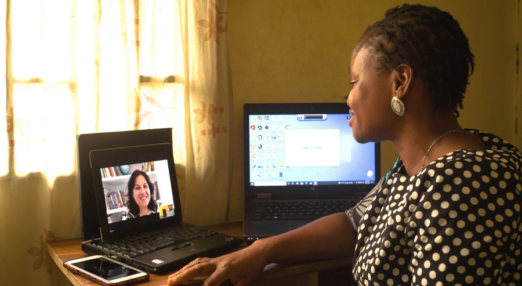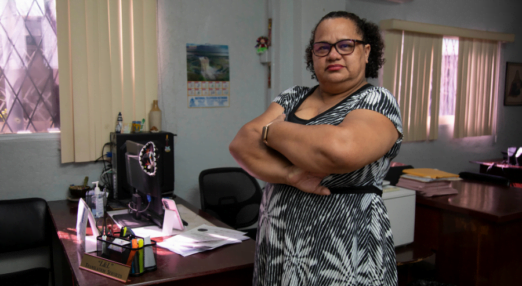Global Recovery Post-Coronavirus: Women Entrepreneurs’ Resilience is Key
Our new Chair of the Trustee Board, Mathias Terheggen, offers his insights.

Global recovery post COVID-19 takes resilience – resilience which is deeply rooted in women entrepreneurs’ capacity to prevail in crisis. Our new Chair, Mathias Terheggen, offers his insights.
Recently, my fellow trustee at the Cherie Blair Foundation for Women, Chris Lane, shared here his thoughts on the risk that the global COVID-19 pandemic poses to women entrepreneurs in low- and middle-income countries, and how for this threat to not in turn impact the democratic nature of our political systems, we must invest in people in general, and women in particular. This is a view I couldn’t agree more with.
In fact, I want to add an important consideration to the case for women’s economic empowerment. As the crisis and our understanding of it progresses, data aggregates that women around the world are carrying an over-proportional share of the Coronavirus’ burden. Women comprise the majority of health and social care workers – not the leadership but the working capacity – and build the front lines of the fight against COVID-19. Women also still bear the lion’s share of childcare responsibility and housework. This inequality now turns into a true threat and diminishes many women’s ability to create economic opportunity, and thereby empowerment, for themselves further. A new survey conducted among women in low- and middle-income countries by our Foundation also clearly exhibits this unfortunate development.
This disproportionately negative impact on women is an injustice in itself that must be corrected through a continued push for global gender equality in all parts of life, and in line with the UN Sustainability Goals, during and after the current pandemic. But an additional argument for women’s economic empowerment is becoming increasingly obvious.
As we slowly turn from reacting to the crisis to re-building our lives and societies, we do so with a new goal in mind – resilience. As we continue to learn that going forward through a global crisis, viral pandemic or other, may not be a singular but potentially a recurring event, we realise that our systems – i.e. our economy, our politics, our societies and our communities – must not only be lean and efficient, and prosper and grow, but from now on they must also be less vulnerable to unexpected shocks. And so, as we re-think the “new normal”, we must accept that our resilience as a group is deeply rooted in women’s capacity to prevail in crisis. For years, investing in girls and women has been advocated for good reasons as being catalytic for well-being. Now, we see that the argument holds the other way around, too.
And so, more than ever, we must strengthen those critical to the physical and economic health of families and communities, everywhere and especially in low- and middle-income countries: we must empower women. The Cherie Blair Foundation for Women has been championing economic empowerment and equality of women for many years. Its recently revised strategy “Women Entrepreneurs. Redefining the Future” is a strong testimony to its vision and continued ambition. And through its 100,000 Women Campaign, recently and successfully launched at Davos alongside the World Economic Forum, it is set to continue to deliver.
It is not only my having shared the organisation’s vision and ambition for many years that has motivated me to recently take on the role of chairing its Board; over recent years, the Foundation has build several strengths that in light of the current pandemic will decisively up its ability to deliver.
Its focus on entrepreneurship as the means to change women’s own lives, and the lives of those around them, for the better is an empowerment of fundamental nature. Entrepreneurship provides all the breadth and flexibility required to let women turn this overwhelming variety of pandemic-induced challenges into an equal number of economic opportunities. And having been a pioneer of the use of mobile communication from its inception, the Foundation’s programme delivery to this day comprehensively leverages technology and remote communication. This makes the Foundation’s operational capacity to impact most ideal for a world characterised by a global pandemic and the need to limit direct human contact to a possible minimum.
Finally, the Foundation’s well-established, proven Mentoring program has always played a vital role in empowering women. But today, as our world is for entrepreneurs more characterised by VUCA (volatility, uncertainty, complexity, ambiguity) than ever, the power of networks – unleashed through individual mentoring – becomes an integral part of building personal resilience.
As domestic needs are skyrocketing, budgets for aid and development outside national borders will be under pressure. This is understandable, but I sincerely hope that we continue to see not only the cost but the long-term benefits considered when nations make decisions around international aid. Benefits such as a heightened resilience against the current and future crisis, that fostering women’s economic empowerment in low- and middle-income countries can realise for all of us, are chief.
This pandemic magnifies inequality, but it also focuses our view on the challenges and opportunities when reshaping our lives for the time after. Women’s economic empowerment is such an opportunity. And with the help of our donors and partners I have no doubt that the Cherie Blair Foundation for Women and its great team will be part of realising it.
Discover more blogs:
-

Get to know our CEO: a letter from Dhivya O’Connor
Two months into her role as CEO, Dhivya O'Connor shares her experience and what we can expect from the Foundation under her leadership.
Read more
-

In celebration of the power of mentoring
Efe Olokpa shares her insight on our Mentoring Women in Business programme.
Read more
-

Women-owned businesses power up Guyana’s economy
With partners, we recently convened a panel discussion led by key actors in Guyana’s women’s entrepreneurship ecosystem.
Read more
